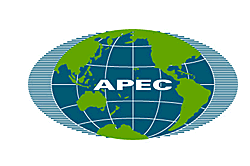




APEC Leaders' Meeting Priorities
Vancouver, British Columbia, Canada
November 21 to 25th, 1997
The Leaders will be discussing APEC's future and in particular the development of infrastructure in the member economies.
What is infrastructure?
Let's use an example: If you want a car, what must you have in order to get that car? You need roads to drive on, money to pay for the car and insurance and gas, a license, proper road signs and lighting... the list is endless. Even to get these things, other things have to happen first: a car manufacturer has to assemble the car, somehow the car has to get from the manufacturer to you, roads need to be built, designers need to design the car, there needs to be quality tests to make sure it's road worthy.
All of these things that help you to do the things you want to do are part of the infrastructure. Infrastructure is not a very obvious thing, but as you can see it is essential in everything we do as human beings!!
Infrastructure is the foundation of everything! In places where there is very little infrastructure, it can be a challenge to do complicated things like start up a business, go on a trip, find work or have a young child in day care.
APEC's Answer to Infrastructure
APEC's central priority is to promote trade liberalization (free trade) amongst its member economies. Under a free trade agreement, the infrastructures of trading partners should be as similar as possible so that goods and services can be exchanged without barriers.
The APEC leaders have chosen to look at five areas for action listed below. They are linked to text that explains what they mean.
- development of the information highway
- integrated transportation
- power infrastructure
- sustainable cities
- infrastructure to support integration and diversification of rural areas
"Development of the information highway" refers to the sharing of information amongst APEC member economies. By promoting the use of the internet and access to technology, APEC members hope to create many virtual networks of people working together to improve economic relations.
"Integrated transportation" means having compatible systems of transportation in all of the APEC economies. Trains, planes, automobiles, buses, boats and any kind of transport used throughout the region are the way that goods and services will move more freely amongst the member economies.
"Power infrastructure" lies behind every kilowatt of energy used by humans, businesses or public institutions in the Asia Pacific region. Developing a power infrastructure means all economies having access to safe, efficient power sources that are not damaging to the environment.
"Sustainable cities" refers to the creation of safe, environmentally secure, livable urban areas being planned for by APEC Leaders. This priority includes planning ahead and taking into account how much populations, environmental concerns and lifestyles will change over the long term.
"Infrastructure to support integration and diversification of rural areas" refers to APEC's need to develop ways to make rural areas economically sound and attractive to the growing urban population in many economies. Integration means slowly making the rural systems part of the urban systems without undervaluing or overvaluing the way things are done in either system. The goal here is to give rural people in APEC economies the means to improve their economic condition.
Questions for Discussion
1. Why do you think infrastructure is such a big issue for APEC? Is it a big deal for your community? How?
2. How do you use the internet? What do you think the benefits are of using the internet to communicate with others?
3. What kind of power do you use in your home or school? How does it get to your house? If you wanted to use a different kind of power, what kinds of changes would you have to make to your house or school and to your way of life?
4. How could your community become more environmentally friendly? What steps would you take to make that change happen?
5. What makes rural areas different from urban areas? Where do cities get money from? Where do rural governments get money from? If you were on a town council in a city, how would you help residents improve their quality of life? Would it change if you were on a village council?Click here for more information on the Youth Communication Centre.
Back to the Leaders Main Page.
© 1997 - TG Magazine / The Students Commission
© 1997 le magazine TG / la Commission des Ètudiants